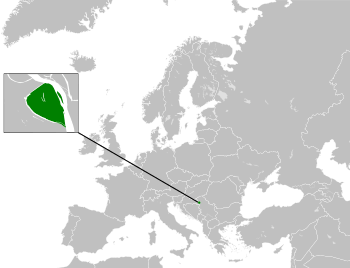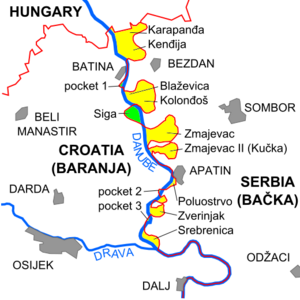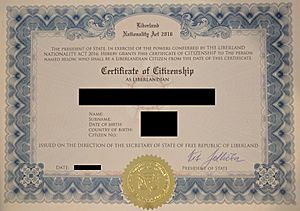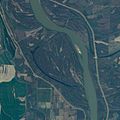Liberland facts for kids
Quick facts for kids
Free Republic of Liberland
|
|
|---|---|
|
Motto: To live and let live
|
|
|
Anthem: "Free and Fair" & "Victory March to Glory Land"
|
|

Location of Liberland
|
|
| Capital | Liberland (city-state) |
| Official languages | English |
| Government | Provisional government chaired by the President |
|
• President
|
Vít Jedlička (founder) |
|
• Vice President
|
Pierre Luis Boitel |
|
• Vice President
|
Boguslav Wozniak |
| Establishment | |
|
• Proclamation
|
13 April 2015 |
| Area | |
|
• Total
|
7 km2 (2.7 sq mi) |
| Currency | Merit |
Liberland, officially known as the Free Republic of Liberland, is a self-declared country. It was started on an unclaimed piece of land on the western side of the Danube River. This land is located between Croatia and Serbia. Liberland was founded on April 13, 2015, by Czech activist Vít Jedlička. He believes in libertarian ideas, which focus on freedom and limited government.
The official Liberland website states that this "nation" was created on land that no country claimed. This happened because Croatia and Serbia have not agreed on their borders for over 25 years. This border disagreement includes some areas east of the Danube. Croatia believes some areas on the west side of the river, including Liberland, belong to Serbia. However, Serbia no longer claims that specific land.
Currently, Croatia controls the area where Liberland is located. But Croatia has stopped people from going to Liberland since it was founded. They have also prevented Croatian and other EU citizens from visiting the area. Before this, almost anyone could visit the land.
No country that is a member of the United Nations officially recognizes Liberland. However, Liberland has started official relationships with Somaliland. It has also connected with other partially recognized or unrecognized states and very small "micronations."
Contents
Where is Liberland?
The border disagreement along the Danube River valley began in 1947. It was never fully solved while Socialist Federal Republic of Yugoslavia existed. The problem grew bigger after Yugoslavia broke apart.
The Border Dispute
Serbia believes the middle line of the Danube River is the international border between the two countries. The Croatian government disagrees. Croatia claims the border follows older lines from maps made in the 1800s. The Danube River has changed its path since then. Because of this, Croatia claims a large area controlled by Serbia. Serbia, however, does not claim the smaller parts on the other side of the river.
President Jedlička says the land they claimed, called Gornja Siga, was not claimed by either country. Gornja Siga means "upper tufa", which is a type of rock.
The Land Itself
The area is about 7 square kilometers (2.7 square miles). Most of it is covered with forests. A journalist who visited in 2015 found an old house that had been empty for about 30 years. The road to the area was in poor condition.
The Danube River flows along the edge of Liberland. This river is an international waterway. This means ships can travel freely to the Black Sea. Liberland visitors and citizens often arrive by boat from Apatin, Serbia. Liberland also has its own ships, the Bitcoin Freedom and the SS Liberty. They keep these ships at a local marina.
How Liberland Started
The Proclamation Day

Vít Jedlička and his friends held a flag ceremony in Gornja Siga. This happened on the same day Liberland was announced.
The Liberland flag has a yellow background. This color stands for libertarianism, which is about freedom. It has a black horizontal stripe in the middle. This stripe symbolizes rebellion or a challenge to old ways. The flag also has the country's coat of arms in the center. Jedlička is a member of the Czech Party of Free Citizens. This party believes in classical liberal ideas, which support individual rights and freedoms.
Jedlička stated that neither Serbia nor Croatia claimed the land. He called it "no-man's land" or terra nullius. He said the border was chosen so it would not interfere with any other country's control. In April 2015, Jedlička said they would send official letters to Croatia, Serbia, and other countries. These letters would formally ask for international recognition.
In December 2015, President Jedlička introduced Liberland's first temporary government. This included ministers for finance, foreign affairs, and other important roles.
Visiting Liberland
Croatian authorities have stopped people from entering the area since May 2015.
In May 2015, Vít Jedlička and his translator were briefly stopped by Croatian police. This happened after they tried to cross the border. Jedlička spent one night in a holding facility. He was then told to pay a fine for illegally crossing the Croatian border. He challenged this decision. He said that at least three Liberland citizens were already inside the area.
Later that month, Vít Jedlička was stopped again. At first, reporters could enter the area with Jedlička. But later, they were also not allowed in. This included journalists from Serbia and Bosnia.
People from many countries were stopped, including Ireland, Germany, Denmark, and the US. Croatian police continued to stop people. This included those who arrived by boat on the international waterway. One Danish activist was held for 5 days. He was then sentenced to 15 days in prison. This caused some protests in Denmark.
In May 2016, Croatian courts made some decisions. They agreed that crossing into Liberland from Croatia was illegal. However, they found that convictions for entering Liberland from Serbia were not correct. The court said the lower court made "a fundamental breach" and "essential procedural violations." It also ruled that "the facts were incorrectly and incompletely established." A new trial was ordered for most of these cases. The lower court needs to decide where the border is, but it has not done this yet. Since then, visitors have come by boat, but no one has settled there permanently.
Is Liberland Legal?
Croatia and Serbia have said that Jedlička's claims are not important. However, they reacted in different ways. In April 2015, the Serbian Ministry of Foreign Affairs said the "new state" does not affect Serbia's border. They believe their border is the Danube River. Croatia, which blocks access to Liberland, says that after international talks, the land should belong to either Croatia or Serbia, not a new country.
A legal article from the University of Chicago looked at Liberland's claim to be a state. It used rules from the Montevideo Convention. The author suggested that if Croatia insists Liberland is part of Serbia, Croatia might be giving up its own claim to the land. Also, if the land is Serbian, and Serbia gives up its claim, the land could become "terra nullius" (unclaimed). In both cases, the land would belong to the first group to claim it, which would be Liberland.
What People Think About Liberland
Legal experts in Serbia and Croatia have wondered if Jedlička has the right to claim this area. It is currently a dispute between the two nations, but neither claims it. Journalists have been unsure how serious Jedlička is. Some have called it a way to get attention.
In May 2015, Petr Mach, the leader of the Party of Free Citizens, supported the idea of a state based on freedom. He added that his party wants the Czech Republic to be a similarly free country.
Goran Vojković, a law professor from Croatia, called Liberland a "circus." He argued that it could weaken Croatia's claim to land on the other side of the Danube. This is because the Liberland project has brought attention to the border dispute.
In 2016, an article in Stratfor said that Liberland is interesting because no country that could claim it seems interested. But it will likely remain a curiosity with little impact on the world stage. For other disputed areas, force and talks will remain the main ways to claim ownership.
Becoming a Liberland Citizen
According to its website, Liberland is looking for people who:
- Respect others and their opinions, no matter their background or beliefs.
- Respect private property, meaning it cannot be taken away.
- Have not been punished for serious crimes.
Liberland received 200,000 applications in one week. In early May 2015, Liberland accepted about 30 citizens. An event was planned in the claimed territory. However, Croatian border police stopped the group from entering from the Croatian side. By October 2017, Liberland had given citizenship to 300 to 400 people. These were people who had "helped move the country forward" or earned enough "Merits" (Liberland's currency). In February 2018, Ron Paul, a former US Congressman, received a Liberland passport and citizenship certificate.
Liberland also gives out an award called the "First Class Order of Merit." This award goes to people who have helped Liberland or the idea of freedom. Famous people who have received this award include publisher Steve Forbes and economist Mark Skousen.
The Liberland constitution has been written and changed several times. It has four parts. It includes a list of rights for citizens. It also explains how the government, political groups, and legal system work.
Official Recognition Efforts
No country that is a member of the United Nations has officially recognized Liberland. However, Liberland has started relationships with Somaliland. Somaliland is a self-declared state that became independent from Somalia in 1991. In September 2017, Liberland and Somaliland signed an agreement. They promised to build closer ties and work together on technology, energy, and banking.
President Jedlička and members of Liberland's temporary government often travel around the world. They try to explain Liberland's goals and build connections for diplomacy and business. In 2017, Jedlička met with U.S. Senators Ted Cruz, Rand Paul, and Ben Sasse. He also met with other elected officials in the United States. In February 2018, Jedlička and his team went to Washington, D.C. to meet with Senator Bob Corker.
Liberland has also started relationships with the region of Savoie (Savoy). This area was independent until 1860, when it became part of France. Today, the people of Savoy are a minority in their own land. Liberland has also begun talks with the region of Brittany (Bretagne).
In December 2018, a UK politician, Bill Etheridge, hosted an event for Liberland in the European Parliament. They discussed Liberland's future.
Statements from Countries
 Croatia: The Croatian Ministry of Foreign and European Affairs has mentioned Liberland. They publicly called it a joke. In June 2015, they said Gornja Siga's status is not decided. But it is not "terra nullius" (unclaimed land). They believe that after international talks, it will be given to Croatia or Serbia, not a third party. However, in a letter in May 2016, the Croatian Foreign Minister called Liberland "a provocative idea which has reached serious proportions." He said it "represents a risk to the Republic of Croatia." In January 2017, Liberland was discussed in the Croatian Parliament.
Croatia: The Croatian Ministry of Foreign and European Affairs has mentioned Liberland. They publicly called it a joke. In June 2015, they said Gornja Siga's status is not decided. But it is not "terra nullius" (unclaimed land). They believe that after international talks, it will be given to Croatia or Serbia, not a third party. However, in a letter in May 2016, the Croatian Foreign Minister called Liberland "a provocative idea which has reached serious proportions." He said it "represents a risk to the Republic of Croatia." In January 2017, Liberland was discussed in the Croatian Parliament. Serbia: The Serbian Ministry of Foreign Affairs has stated that Liberland does not affect Serbia's border. They see the project as a "non-important matter."
Serbia: The Serbian Ministry of Foreign Affairs has stated that Liberland does not affect Serbia's border. They see the project as a "non-important matter." Egypt: The Egyptian Ministry of Foreign Affairs has warned people about possible scams related to Liberland. These scams might target people looking for jobs abroad. They advised Egyptians to get information from the Foreign Ministry, not social media.
Egypt: The Egyptian Ministry of Foreign Affairs has warned people about possible scams related to Liberland. These scams might target people looking for jobs abroad. They advised Egyptians to get information from the Foreign Ministry, not social media. Czech Republic: The Czech Ministry of Foreign Affairs has said it has nothing to do with Mr. Jedlička's activities. They added that Mr. Jedlička, like other Czech citizens in Croatia or Serbia, must follow local laws. The Czech Republic believes Mr. Jedlička's actions are "inappropriate and potentially harmful." Through their embassy, they warned that creating a new "state" has no basis in international law. They also said that crossing the Croatian border outside official crossings, as travelers to Liberland do, is against the law.
Czech Republic: The Czech Ministry of Foreign Affairs has said it has nothing to do with Mr. Jedlička's activities. They added that Mr. Jedlička, like other Czech citizens in Croatia or Serbia, must follow local laws. The Czech Republic believes Mr. Jedlička's actions are "inappropriate and potentially harmful." Through their embassy, they warned that creating a new "state" has no basis in international law. They also said that crossing the Croatian border outside official crossings, as travelers to Liberland do, is against the law. Poland: In July 2016, seven members of the Polish Parliament asked their Foreign Minister when Poland would recognize Liberland. The answer was that Liberland does not meet the requirements to be a state.
Poland: In July 2016, seven members of the Polish Parliament asked their Foreign Minister when Poland would recognize Liberland. The answer was that Liberland does not meet the requirements to be a state.
Support from Political Parties
Since 2015, several smaller political parties have shown support for Liberland. These include:
- The Capitalist Party in Norway
- The Libertarian Party (Spain)
- The Swiss Independence Party up!
- The Liberal Democratic Party (Turkey) (LDP)
- The Libertarian Party of Canada
- The Libertarian Party (United States)
- The UK Libertarian Party
Support from Other Micronations
A few micronations, which are very small self-declared entities, have supported Liberland.
- The Kingdom of North Sudan, which claims an area between Egypt and Sudan, has recognized Liberland.
- The Kingdom of Enclava, which claims part of a disputed area near Liberland, has recognized Liberland.
- The Principality of Sealand, a platform in the North Sea, has shown support for Liberland.
Statements from Organizations
- In April 2017, Bitnation announced a partnership with Liberland.
- In April 2017, Liberland applied to join the UNPO. This organization helps groups that are not represented in the United Nations. Liberland's application was presented in Brussels, Belgium. In June 2017, a Liberland group was invited to observe a UNPO meeting.
- In April 2018, Liberland signed an agreement with IIMSAM. This is an organization that observes the United Nations Economic and Social Council.
Images for kids
See also
 In Spanish: República Libre de Liberland para niños
In Spanish: República Libre de Liberland para niños
 | Toni Morrison |
 | Barack Obama |
 | Martin Luther King Jr. |
 | Ralph Bunche |





